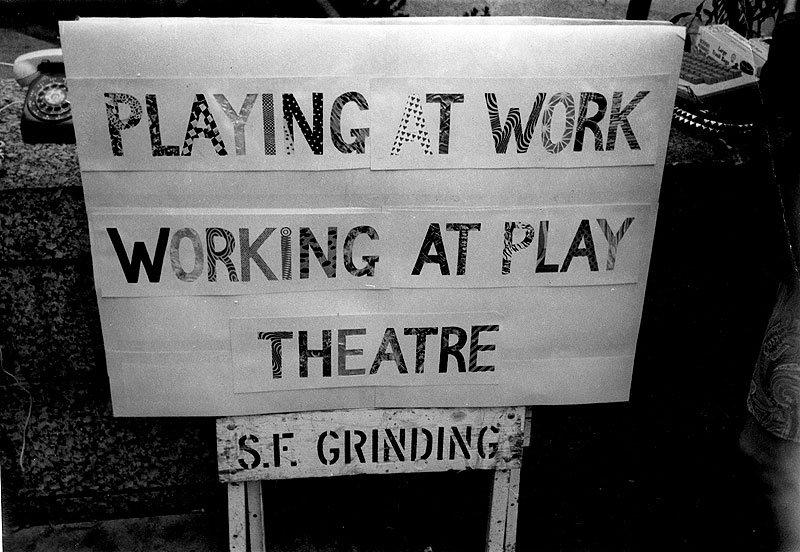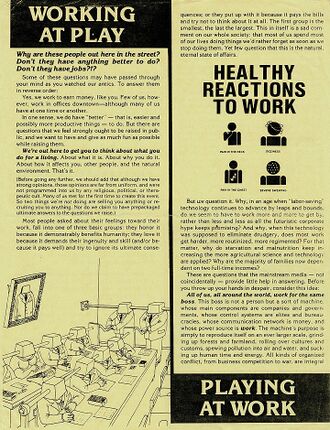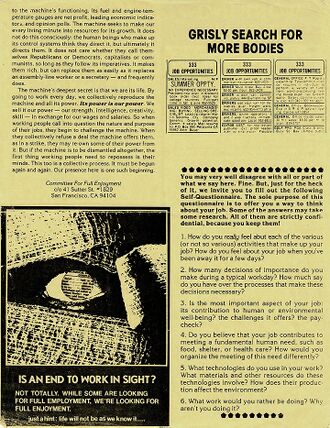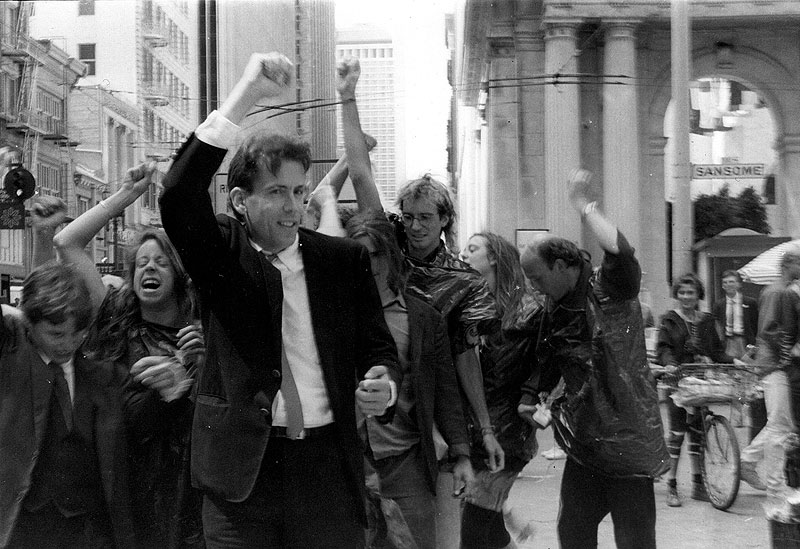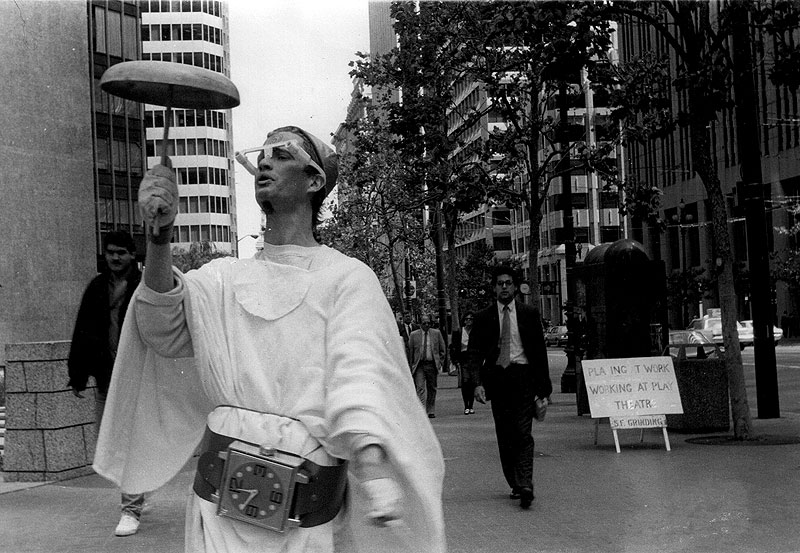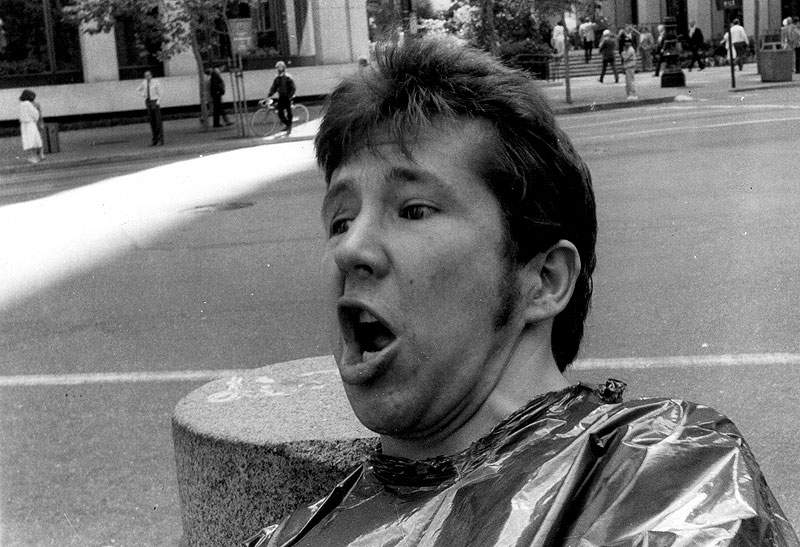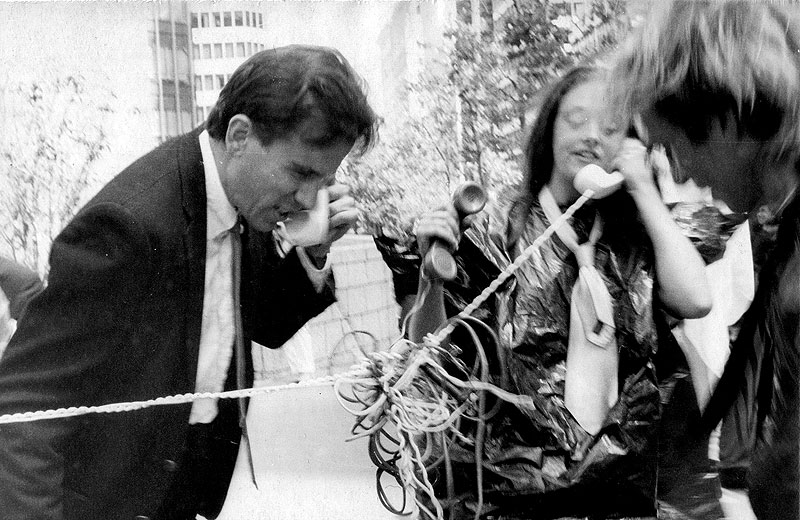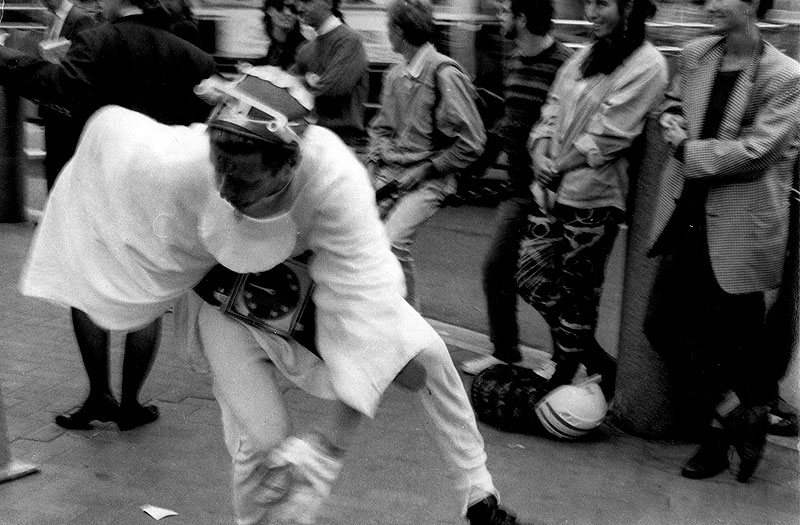Working at Play—Playing at Work
Primary Source
In mid-1983, the Commmittee for Full Enjoyment made one of its earliest appearances in San Francisco. Consisting of an assorted crew of radicals, some associated with Processed World magazine, they embarked on a theatrical intervention in the Financial District. It was called "Working at Play—Playing at Work Theater" and consisted of a serious of office tasks portrayed in their full absurdity along Market Street. Here first is the accompanying flyer and text, and after are some images of the "performances."
WORKING AT PLAY—PLAYING AT WORK
Why are these people out here in the street? Don't they have anything better to do? Don't they have jobs?!?
Some of these questions may have passed through your mind as you watched our antics. To answer them in reverse order:
Yes, we work to earn money, like you. Few of us, however, work in offices downtown—although many of us have at one time or another.
In one sense, we do have "better"—that is, easier and possibly more productive things—to do. But there are questions that we feel strongly ought to be raised in public, and we want to have and give as much fun as possible while raising them.
We're out here to get you to think about what you do for a living. About what it is. About why you do it. About how it affects you, other people, and the natural environment. That's it.
(Before going any further, we should add that although we have strong opinions, those opinions are far from uniform, and were not programmed into us by any religious, political, or therapeutic cult. Many of us met for the first time to create this event. So two things we're not doing are selling you anything or recruiting you to anything. Nor do we claim to have prepackaged ultimate answers to the questions we raise.)
Most people asked about their feelings toward their work, fall into one of three basic groups: they honor it because it demonstrably benefits humanity; they love it because it demands their ingenuity and skill (and/or because it pays well) and try to ignore its ultimate consequences; or they put up with it because it pays the bills and try not to think about it at all. The first group is the smallest, the last the largest. This in itself is a sad comment on our whole society: that most of us spend most of our lives doing things we'd rather forget as soon as we stop doing them. Yet few question that this is the natural, eternal state of affairs.
But we question it. Why, in an age when "labor-saving" technology continues to advance by leaps and bounds, do we seem to have to work more and more to get by, rather than less and less as all the futuristic corporate hype keeps promising? And why, when this technology was supposed to eliminate drudgery, does most work get harder, more routinized, more regimented? For that matter, why do starvation and malnutrition keep increasing the more agricultural science and technology are applied? Why are the majority of families now dependent on two full-time incomes?
These are questions that the mainstream media—not coincidentally—provide little help in answering. Before you throw up your hands in despair, consider this idea:
All of us, all around the world, work for the same boss. This boss is not a person but a sort of machine. whose main components are companies and governments, whose control systems are elites and bureaucracies, whose communication network is money, and whose power source is work. The machine's purpose is simply to reproduce itself on an ever-larger scale, grinding up forests and farmland, rolling over cultures and customs, spewing pollution into air and water, and sucking up human time and energy. All kinds of organized conflict, from business competition to war, are integral to the machine's functioning. Its fuel and engine-temperature gauges are net profit, leading economic indicators, and opinion polls. The machine seeks to make our every living minute into resources for its growth. It does not do this consciously: the human beings who make up its control systems think they direct it, but ultimately it directs them. It does not care whether they call themselves Republicans or Democrats, capitalists or communists, so long as they follow its imperatives. It makes them rich but can replace them as easily as it replaces an assembly-line worker or a secretary—and frequently does.
The machine's deepest secret is that we are its life. By going to work every day, we collectively reproduce the machine and all its power. Its power is our power. We sell it our power—our strength, intelligence, creativity, skill—in exchange for our wages and salaries. So when working people call into question the nature and purpose of their jobs, they begin to challenge the machine. When they collectively refuse a deal the machine offers them, as in a strike, they may re-own some of their power from it. But if the machine is to be dismantled altogether, the first thing working people need to repossess is their minds. This too is a collective process. It must be begun again and again. Our presence here is one such beginning.
—Committee For Full Enjoyment
You may very well disagree with all or part of what we say here. Fine. But, just for the heck of it, we invite you to fill out the following Self-Questionnaire. The sole purpose of this questionnaire is to offer you a way to think about your job, Some of the answers may take some research. All of them are strictly confidential, because you keep them!
1. How do you really feel about each of the various (or not so various) activities that make up your job? How do you feel about your job when you've been away from it for a few days?
2. How many decisions of importance do you make during a typical workday? How much say do you have over the processes that make these decisions necessary?
3. Is the most important aspect of your job: its contribution to human or environmental well-being? the challenges it offers? the paycheck?
4. Do you believe that your job contributes to meeting a fundamental human need, such as food, shelter, or health care? How would you organize the meeting of this need differently?
5. What technologies do you use in your work? What materials and other resources do these technologies involve? How does their production affect the environment?
6. What work would you rather be doing? Why aren't you doing it?

